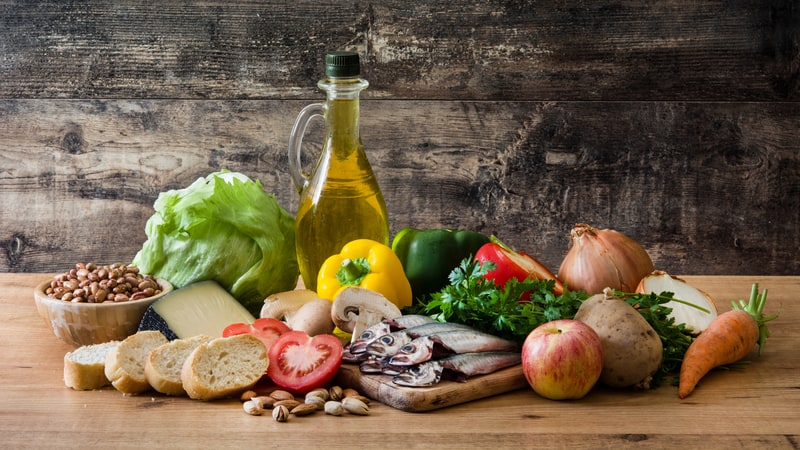Health: Eat to Glow!
Foods that will make your aura dazzle

The old axiom “you are what you eat” holds true. What we eat can play a huge role in the health of various areas of our bodies, including the brain and heart.
And that list includes the skin.
A trip to the supermarket or farmers market offers up a bounty of vanity fare as certain foods; many that can turn around tired-looking skin and even offer some natural protection from the rays of the yellow orb above. “Skin health starts from the inside and is dependent on how well we nourish it through our dietary choices,” says dietitian Cindi Lockhart, owner of Lockhart Wellness Solutions LLC.
Our skin takes a beating daily from environmental stressors, so it’s important to feed it what it needs. Here’s how to chew your way to a better complexion.
Eat the Rainbow to Glow
Think of colorful veggies as an edible fountain of youth. British researchers found that an increased intake of carotenoids, found in bright vegetables over 6 weeks can have a beneficial impact on skin; including reducing reddening and other skin discoloration that impacts appearance. Find carotenoids in vegetables like sweet potatoes, tomatoes, leafy greens, and bell peppers.
The beauty benefits were witnessed with just three servings a day of carotenoid-rich veggies and fruits. “Carotenoids act as potent antioxidants; they protect our skin against environmental stressors including the sun’s UV rays,” Lockhart says. Case in point: the antioxidant beta-carotene has been shown to offer some protection against sunburn.
Ditch the Standard American Diet
If you want to save face be sure to go easy on fast-food and other overly processed stuff. A 2020 study in the Journal of Investigative Dermatology discovered that a typical Western diet is rich in fat and sugar; it may lead to inflammatory skin conditions such as psoriasis. “The standard diet is very inflammatory. It lacks the phytonutrients, antioxidants, and nutrients that protect our skin,” notes Lockhart. Instead, fill your diet with anti-inflammatory whole foods that can show your skin some love.
Go Nuts for Almonds
Here’s more proof to support a “beauty from the inside out” approach to skin health and glow. An investigation from the University of California, Davis suggests daily almonds; they say it might improve measures of wrinkle width and severity. The total amount of almonds consumed was about two ounces daily for four months by postmenopausal women; so, it remains to be seen if lower amounts of nut intake in other demographics will also benefit skin appearance. But the researchers are optimistic that the beneficial fats and antioxidants in almonds have anti-aging powers for all.
Furthermore, almonds are also part of a whole list of wintertime treats!
Join ‘Club Med’
The Mediterranean diet isn’t just good for your heart; it can also be an ally in the battle against a potentially deadly skin disease. A report in The American Journal of Clinical Nutrition discovered that women who adhered most closely to the Mediterranean diet over 15 years benefited from a lower risk of skin cancer; particularly melanoma and basil cell carcinomas. Lockhart explains that this eating style, which emphasizes vegetables, fruits, olive oil, and whole grains can provide a potpourri of nutrients; anti-inflammatory omega-3 fats; and phytonutrients that may help shield you from skin cancer. For instance, greater intakes of the Med-favorite tomato, which is rich in the potent antioxidant lycopene, have been shown to confer protection from UV-induced skin cancer tumors.
The Great Grape
If you like to regularly venture into the great outdoors, pop a few grapes first; they could help you keep premature skin aging at bay via some sunburn-protective effects. According to a study by scientists in Spain, the flavonoids found in grapes, especially darker varieties, can act as natural photoprotection. They lessen UV-ray-activated reactive oxygen species (ROS) from forming and causing skin cell death.
These results are not enough to make sunscreen obsolete; but suggests that sweet grapes are a summer-friendly snack your skin could benefit from.
Don’t Be Fresh Obsessed
Looks like there might be a gut-skin axis. Preliminary research suggests that exposure to higher amounts of the probiotic Lactobacillus rhamnosus can impact the expression of certain genes in the skin involved in adult acne.
Other science published in the journal Nutrition Research found that higher intakes of fermented foods may reduce the risk of developing eczema. (Of note, eating more meat and processed packaged foods caused higher rates of eczema.) “The gut and skin are innervated organs and each affects the other, health-wise,” says Lockhart. Research is still in its infancy, but Lockhart says you can try to combat pimples and red, itchy skin (and also keep your digestive health in tip-top-shape) by eating more fermented foods like kimchi, kefir, miso, and sauerkraut.
Go Fish for Salmon
Better known as a great source of heart-benefiting omega-3 fats, this swimmer also serves up an important compound to help stamp out photoaging. Data presented in the journal PLOS ONE suggest that astaxanthin, an antioxidant pigment found in pinkish fish like salmon and arctic char, can accumulate in the skin where it protects against the harmful effects of UV exposure including the skin water loss that contributes to wrinkles. Likewise, an Italian study also found that low weekly intake of fresh fish, as well as fruits or vegetables, were associated with higher rates of adult acne.
Joy for Soy
Additionally, one study found that increasing the amount of soy-derived isoflavones in the diets of postmenopausal women improved skin thickness and boosted concentrations of collagen and elastic fibers for a more youthful appearance. For example, find isoflavones by reaching for tofu, tempeh, and edamame. So, as a bonus, the amino acids in soy-based foods can supply our bodies with the essential building blocks to support collagen production, the protein responsible for helping promote skin firmness which tends to suffer as we age.
Reprinted with permission from Environmental Nutrition, a monthly publication of Belvoir Media Group, LLC. 800-829-5384. www.EnvironmentalNutrition.com.
© 2020 BELVOIR MEDIA GROUP


